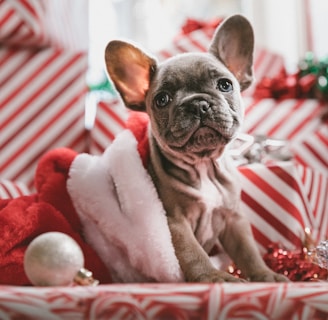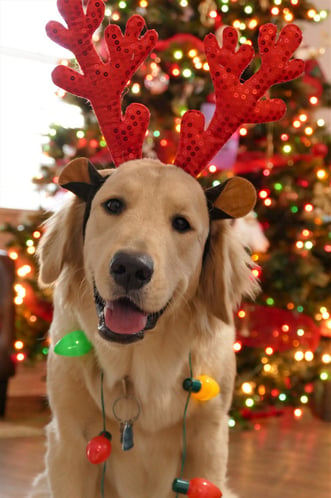Keeping Your Dog Safe This Christmas: From Fireworks to Festive Treats (And What to Do If They Eat the Wrong Thing)
Ah, Christmas! The twinkling lights, the smell of gingerbread wafting through the house, and the excitement of spending time with loved ones. But while you’re decking the halls and counting down the days to Santa’s big arrival, don’t forget about the most important member of your household—your dog. They might not understand all the holiday hustle and bustle, but they do feel the stress, the noise, and the temptation of those tasty (but dangerous) treats lying around. So, grab a cup of hot cocoa (or maybe just a dog-friendly treat for your furball) and let’s go over how to keep your dog safe this Christmas. From fireworks that might send them running for cover to sneaky ways they can get into trouble with the food, we’ve got you covered. And of course, we’ll talk about some fabulous gifts to make this holiday season paw-sitively unforgettable for your pup!
Martha Love
11/15/20246 min read


Fireworks: The Scary Sparkles in the Sky
Let’s face it—if you’ve ever seen your dog cower under the couch or hide behind the curtains when fireworks go off, you know how terrifying it can be for them. Christmas might not be known for big fireworks displays (that’s more of a 4th of July thing), but New Year’s Eve is just around the corner, and that’s when those loud bangs and pops are more common.
How to Help Your Dog with Fireworks Anxiety
1. Create a Safe Space: Dogs often find comfort in enclosed spaces, so create a cozy hideaway for them in a quiet room, far away from windows. A crate (if your dog is crate trained) or a comfy bed in the corner can do wonders. Dim the lights, and maybe play some soothing music to drown out the noise.
2. Distraction, Distraction, Distraction: A good chew toy3. Use Anxiety Relief Products: There are many products designed to help with anxiety, from calming collars that release pheromones (kind of like doggy aromatherapy) to anxiety wraps like the ThunderShirt, which apply gentle pressure to your dog’s torso to help them feel calm.
4. Calm and Reassure: If your dog is visibly stressed, it’s important not to reinforce their fear by coddling them too much. This can encourage anxious behavior. Instead, stay calm and give them plenty of reassurance with your voice and a gentle petting.
5. Consider Professional Help: If your dog has extreme anxiety around fireworks or loud noises, it might be worth talking to your vet. They can or a puzzle feeder can keep your pup distracted and entertained while the fireworks are going off. The best part? It gives them something to focus on other than the scary sounds outside.
Suggest behavior training or, in some cases, prescribe medication to help keep your dog calm during the festivities.
The Dangers of Festive Foods: What Not to Let Your Dog Eat
Christmas dinners are a feast for the senses: rich gravies, delicious roasted meats, buttery mashed potatoes, and a wide assortment of festive desserts. But before you hand over a slice of turkey or a taste of your Christmas pudding, it’s important to remember that not all foods are safe for your dog.
Toxic Holiday Foods
1. Chocolate: We all know that chocolate is bad for dogs, but it’s worth repeating. The theobromine in chocolate can cause vomiting, diarrhea, and even seizures in dogs. So if you’re indulging in Christmas treats, make sure your pup doesn’t get any of the chocolate-covered nuts, candy canes, or chocolate yule logs lying around.
2. Grapes and Raisins: These are holiday snack staples (hello, fruitcake), but they’re a big no-no for dogs. Even a small amount can cause kidney failure in some dogs, so keep those raisins far from Fido’s reach. It might seem like an innocuous ingredient in a dessert, but it’s best to be cautious.
3. Onions and Garlic: Found in many holiday dishes, onions and garlic can cause severe gastrointestinal upset and even lead to red blood cell damage. So while you’re enjoying your savory stuffing, make sure your pup sticks to their regular meals.
4. Nuts (Especially Macadamia Nuts): Macadamia nuts are particularly dangerous for dogs, causing symptoms like vomiting, tremors, and weakness. Other nuts, while not as toxic, can still cause digestive upset or choking hazards, so keep those snack bowls out of reach.
5. Xylitol: This sugar substitute is found in sugar-free candies, gum, and baked goods, and it’s extremely toxic to dogs. Even small amounts can lead to hypoglycemia (low blood sugar) and liver failure. Always check the ingredients if you’re sharing a snack with your dog.
6. Cooked Bones: A holiday ham or turkey might leave you with some bones to dispose of, but don’t make the mistake of offering these to your dog. Cooked bones can splinter easily, causing choking or internal injuries.
7. Alcohol: It might be tempting to offer your pup a taste of your holiday cheer, but keep your drinks out of their reach. Even small amounts of alcohol can cause dangerous drops in blood pressure, body temperature, and central nervous system function.


The Best Christmas Gifts for Your Dog
Of course, Christmas isn’t just about keeping your dog safe—it’s also about spoiling them with love, affection, and the best gifts. So, what should you get your four-legged friend this year? We’ve rounded up a list of some of the best dog-friendly Christmas presents that will have your pup wagging their tail in excitement!
Toys and Treats
1. Interactive Toys: Dogs love a good challenge, and interactive toys like puzzle feeders or treat-dispensing balls will keep their minds sharp (and entertained) throughout the holidays. These toys make great gifts because they provide mental stimulation and can help alleviate boredom when you’re busy with guests or holiday prep.
2. Durable Chew Toys: If your dog is a heavy chewer, consider getting them a super-durable chew toy like a Kong or a Nylabone. These toys are built to withstand even the most determined chewing sessions, and they’re perfect for keeping your dog occupied when you're trying to enjoy your Christmas dinner.
3. Snuggle-Ready Blankets: Nothing says cozy like a warm, soft blanket. Get your dog their very own Christmas-themed blanket to curl up on after a long day of playing with their new toys. Bonus points if it’s machine washable!
4. Gourmet Dog Treats: Treat your pup to some tasty, holiday-themed treats. There are plenty of dog bakeries online that offer special Christmas dog cookies, ranging from gingerbread bones to “snowman” treats. If you’re feeling crafty, you can even make some yourself (just make sure they’re dog-safe, of course).
5. Personalized Dog Tags or Collars: For a touch of holiday flair, you can get your dog a personalized collar or ID tag. Some come with festive designs or can even be customized with your dog’s name and your contact information in case they wander off during the holiday festivities.
6. Fashionable Dog Sweater: If your dog is the type who enjoys a little extra warmth during the colder months (or just likes the attention), a cute Christmas sweater or jacket might be the perfect gift. It’s stylish, snuggly, and totally Instagram-worthy.
7. Automatic Treat Dispenser: For the high-tech pup, an automatic treat dispenser can be the ultimate gift. With these gadgets, you can remotely toss your dog treats, providing them with a fun and interactive way to receive snacks.


Final Thoughts: Safe, Happy, and Pawsitively Festive
Christmas is a magical time of year, but it’s also full of potential hazards for our four-legged friends. From fireworks to food temptations and holiday stress, there’s a lot to keep in mind when it comes to your pup’s safety. By taking a few simple precautions, you can ensure your dog enjoys the season as much as you do—without any unexpected trips to the vet!
So, as you plan your holiday celebrations, remember to keep those toxic foods out of reach, create
What to Do if Your Dog Eats Something Dangerous
If your dog manages to get into something they shouldn’t, don’t panic, but do act quickly. Here’s what you should do:
1. Assess the Situation: Try to figure out how much of the harmful food your dog has consumed. If it’s a small amount, they may just have a stomach upset. If it’s a larger quantity or something very toxic (like chocolate or xylitol), you’ll need to seek immediate veterinary care.
2. Call the Vet: When in doubt, always call your vet or an emergency animal clinic. They’ll be able to advise you on the next steps, whether it’s inducing vomiting or simply monitoring for symptoms.
3. Know Your Dog’s Size and Weight: This information can help your vet determine whether your dog is at risk for serious issues. Always have a current weight for your dog handy when calling the vet.
4. Induce Vomiting (Only if Advised): If your vet recommends it, they might tell you to induce vomiting. Never try this on your own unless instructed, as some substances can cause more harm if vomited.
5. Watch for Symptoms: Depending on what your dog ingested, symptoms might include vomiting, diarrhea, lethargy, or strange behavior. Keep a close eye on your dog and get them to a vet if anything seems off.


Sniffy Snoots
Disclosure: I only recommend products I would use myself.
All opinions expressed here are my own.
This site may contain affiliate links and I may earn a small commission, at no extra cost to you.
© 2024. All rights reserved.
